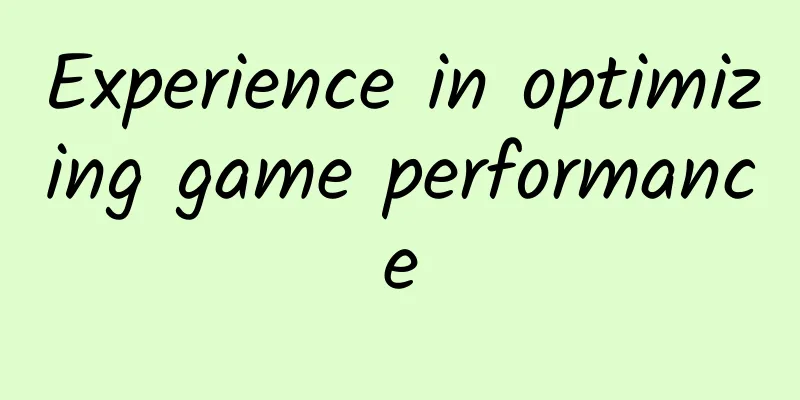Experience in optimizing game performance

|
Introduction to Optimization When it comes to game optimization, it is often divided into these steps in game development:
In game development, you must first make tools, perform profiles, and then optimize. Therefore, when talking about optimization, you have to talk about profiles. Some common tools come with the engine and IDE, such as Unity's built-in Profiler, which includes a variety of performance analysis tools such as CPU, GPU, Memory, etc. Others such as GPA, Xcode Instrument and Visual Studio, Intel's built-in memory management tools also need to be learned and used when necessary. Other tools need to be written according to the needs of the game, such as turning off all special effects with one click, changing the resolution with one click, etc., setting the number of NPCs on the field with one click. Simple games such as Papa Three Kingdoms use shortcut keys to open the Profile function, and more complex games such as Uncharted use the in-game console to perform more detailed Profie. Next, let’s talk about the four main considerations in game optimization: CPU Questions raised:
Common optimization methods:
GPU Questions raised:
Common optimization methods:
IO and Network Questions raised:
Common optimization methods:
Memory Questions raised:
Common optimization methods:
Some thoughts on the projects I have done Need to focus on non-functional requirements This thought came to me from the answer to the question "Why do many seemingly uncomplicated websites, such as Facebook, require a large number of *** experts to develop?" As the answerer said: "In fact, from my experience, in general, for many software projects and products, the cost, difficulty and workload of non-functional requirements exceed those of functional requirements. In specific software fields, such as websites (especially websites with massive user scale such as Taobao and Facebook), finance (banking and securities), and telecommunications, the importance, workload and technical difficulty of implementing non-functional requirements are far greater than the implementation of functional requirements. Moreover, the implementation of functional requirements, in most cases, relies more on business experts (or good product managers) rather than technical experts, and the implementation of non-functional requirements is precisely an important issue that challenges technical experts." After working on the game front-end for a while, everyone is complaining that the game front-end has low technical content and can only write business logic. However, the trap is that as a front-end developer, you should write as little business logic as possible. Have you paid attention to the following modules?
Need to be good at defining the scope and narrowing the problem area In the past few months, I participated in the development of two Unity3D projects, All People Assault and Honkai Academy 2, and encountered some issues related to performance optimization. When problems occur in the program, we often solve the problems through so-called "experience". This Quick Link capability is naturally very important, but experience is not the only thing. But on the other hand, when we cannot find the answer from our past experience, we have to solve the problem by dividing the scope and narrowing the problem range. Many people tend to just stick to a partial vision in their own experience to deal with the problem, and the result will definitely not be satisfactory. Summarize In fact, the optimization of these four aspects always checks and balances each other. If you optimize one aspect well, problems in another aspect will arise. For example, if we use dynamic loading and unloading of resources, although this reduces memory usage, it will cause the problem of prolonged loading time on IO. Therefore, when we optimize games, we should not pursue perfection too much. Good Enough Is Fine. We should finally achieve a balance among the above four aspects. We should avoid over-optimizing one aspect, which will cause problems in other aspects. Sometimes, it is better not to optimize at all. |
<<: Facebook now has voting rights on emoji standards
>>: Post-WeChat Era: Disputes over Social Apps
Recommend
Cool horizontal elastic menu
Source code introduction: MySpringMenu is a cool ...
How to do cross-border marketing? One article explains
Hello everyone, today’s topic is very big - cross...
How about Begeel watches that inherit a century of watch history and culture?
Begeel is a watch brand born in Switzerland. It i...
A major benefit for information flow advertising, “Super” Fans Pass is coming! Attached effect case
I believe that friends in the channel circle have...
Changsi Advertising won the Dark Horse Enterprise Award at the 2014 New Marketing Awards
[[127166]] On January 30, the award ceremony of &...
The latest news on the epidemic in Tangshan, Hebei in 2022: Is Tangshan under lockdown? When will the ban be lifted?
Recently, the Omicron variant of the new coronavi...
Why is it that you have read 888 articles but still feel nothing like 66666?
I don't speak for any company and I don't...
Why is the PC version of WeChat so difficult to use? Zhang Xiaolong expressed his "selfish motives"
As we all know, WeChat did not have a PC version ...
Android image zooming animation is so simple
[[190226]] There is such a requirement, you need ...
Teach you step by step how to quickly earn your first pot of gold in the VR industry
I have been in the VR industry for a year and a h...
Video account IP evolution wealth camp, from 0 to 1, from positioning to monetization to make money (worth 1577 yuan)
Video account IP evolution wealth camp, from 0 to...
Things about the bad code you wrote
[[141812]] 1. Summary I have written a lot of cod...
Server rental cloud server rental 618 mid-year promotion discount price
Cloud server BCC intensive computing IC2 CPU Memo...
Baidu Tieba traffic diversion tips!
Our topic today is mainly to share with you our t...
Smartphones have revolutionized key usage and security management
[[400952]] Mobile access is impacting the way we ...

![The estimation tool can estimate the following data [Baidu bidding]](/upload/images/67cc3038820e5.webp)







